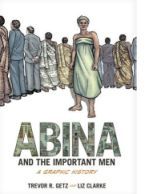Abina and The Important Men: A Graphic History
 Abina and The Important Men: A Graphic History
Abina and The Important Men: A Graphic History
Biography / History / Gold Coast / Ghana / Graphic novel / Sankofa
Oxford University Press
2012
ISBN Paper 9780199844395 / 0199844399

Based on an 1876 court transcript and told in comic-book format, this book tells the story of a West African woman named Abina Mansah, who was wrongfully enslaved, escaped to British-controlled territory, and then took her former master to court.
“Am I free?” Abina and the Important Men recovers the compelling courtroom drama of a young woman who demanded this question in West Africa in 1876. Seized from her family as a teenager, forced to carry heavy loads, and sold into domestic slavery, Abina wanted to have control over her own life again. She brought her case to a colonial court, where a British magistrate leaned on African merchants and kings to decide Abina’s fate. This is a universal story of deception and truth that will appeal to anyone who has sought greater independence from the obligations of family, employer, or government. Abina’s legal battle comes to life in the graphic novel. Graphically illustrating an adventurous life is a risk but would be impactful if successful. A section on historical background explains the complexities of early British occupation in West Africa when a young woman could be simultaneously free and enslaved.
Abina and the Important Men engages with thorny issues in World History–human trafficking, colonialism, cultural autonomy, and women’s rights. While the stories preserved over time are often those of male leaders, this book brings to life the concerns of a young woman at a pivotal moment in African history. Slavery becomes a contested terrain, as cultural practices interface with an emerging wage economy and British officials turn a blind eye to the presence of underpaid domestic workers in the households of African merchants. Through the multiple voices of a forgotten heroine and a cast of African, European, and Euro-African men, it shows the many perspectives that helped shape our concepts of freedom and independence. Highly Recommended.
Reviewed by: Abena Dove Osseo-Asare, Assistant Professor of History, University of California, Berkeley
